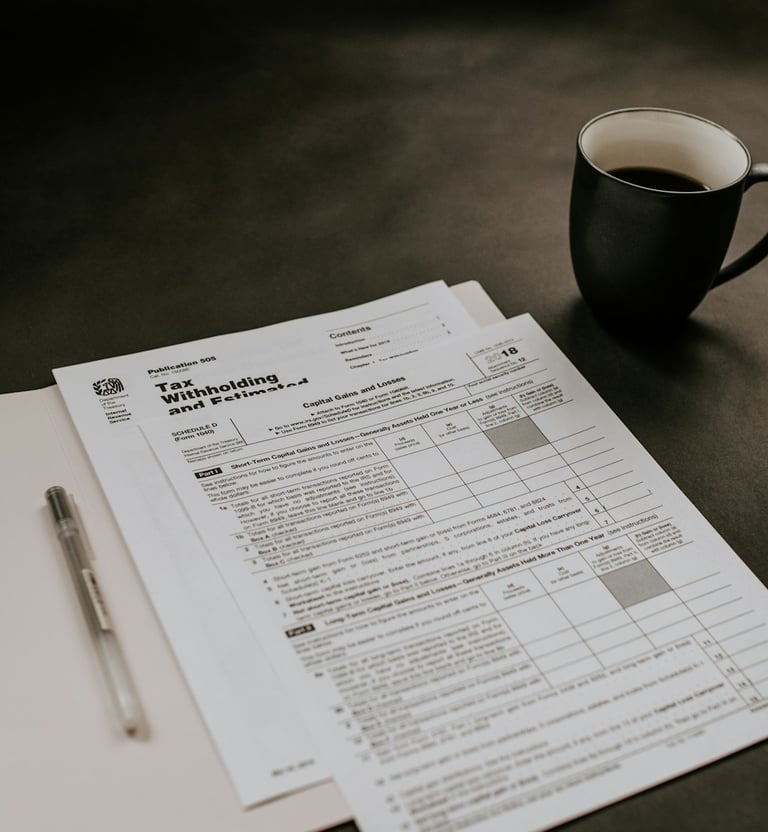Why Tax Strategy Is More Important Than Tax Preparation
Tax strategy, focused on continuous proactive planning, is crucial for long-term financial success. It optimizes tax positions, aligns with financial goals, and offers year-round benefits over mere tax preparation.
MINIMIZE TAX BURDENSTAX STRATEGYLONG-TERM FINANCIAL SUCCESSTAX PREPARATIONTAX PLANNINGDEDUCTIONS AND CREDITSFINANCIAL GOALS
Deus Vult Financial
8/30/20256 min read


When it comes to managing finances, a well-thought-out tax strategy can be a game-changer for both individuals and businesses. While tax preparation focuses on meeting annual obligations, tax strategy involves continuous planning that plays a crucial role in achieving long-term financial success. By identifying opportunities for deductions and credits, and selecting the right entity structures, you can significantly minimize tax burdens and enhance your overall financial position. Are you making informed decisions that align with your financial goals, or are you simply reacting to the demands of tax season? In this blog post, we will guide you through the benefits of proactive tax planning and how it can secure your financial future.## Understanding Tax Strategy
Tax strategy is a proactive approach to managing your financial obligations. It involves careful planning and foresight to optimize your tax position throughout the year.
Importance of Proactive Planning
Proactive tax planning is crucial for long-term financial success. It allows you to take control of your tax situation rather than simply reacting to it.
By planning ahead, you can identify opportunities to reduce your tax burden before they pass. This approach helps you make informed decisions about investments, expenses, and income timing.
Proactive planning also gives you time to implement strategies gradually, avoiding last-minute scrambles that often lead to mistakes or missed opportunities.
Tax strategy can result in significant savings over time, freeing up more resources for your financial goals.
Year-Round Approach Benefits
A year-round approach to tax planning offers numerous benefits over a once-a-year tax preparation focus.
Continuous monitoring of your financial situation allows you to adjust your strategy as circumstances change. This flexibility can be particularly valuable in times of economic uncertainty or personal life changes.
Regular check-ins with your tax professional keep you informed about new tax laws or regulations that might affect your situation. This knowledge empowers you to make timely decisions.
Year-round planning also helps smooth out your tax obligations, potentially avoiding large, unexpected tax bills at the end of the year.
By making tax planning a habit, you're more likely to spot opportunities for tax-efficient decisions in your day-to-day financial life.
Long-Term Financial Success Through Strategy
A well-executed tax strategy is a cornerstone of long-term financial success. It goes beyond annual tax savings to support your broader financial objectives.
Aligning Tax Strategy with Financial Goals
Aligning your tax strategy with your financial goals is essential for maximizing your overall financial health.
Start by clearly defining your short-term and long-term financial objectives. These might include saving for retirement, funding education, or growing a business.
Next, work with a tax professional to identify tax strategies that support these goals. For example, if retirement savings is a priority, you might focus on maximizing contributions to tax-advantaged accounts.
Consider how different financial decisions might impact your tax situation. A holistic approach ensures that tax considerations are factored into all major financial choices.
Regular reviews of your tax strategy alongside your financial plan help ensure they remain in sync as your goals evolve over time.
Enhancing Financial Position
A strategic approach to taxes can significantly enhance your overall financial position.
By minimizing your tax burden, you free up more capital for investments, savings, or debt reduction. Over time, this can lead to substantial growth in your net worth.
Tax-efficient investment strategies can boost your after-tax returns, accelerating your progress toward financial goals.
Understanding the tax implications of different income sources can help you make informed decisions about career moves or business ventures.
Proper tax planning can also help you navigate major life events, such as buying a home or starting a business, in a financially optimal way.
Key Elements of Strategic Tax Planning
Strategic tax planning involves several key elements that work together to optimize your tax position and support your financial goals.
Identifying Deductions and Credits
Identifying all available deductions and credits is a crucial part of effective tax planning.
Start by familiarizing yourself with common deductions in your situation, such as mortgage interest for homeowners or business expenses for self-employed individuals.
Keep detailed records throughout the year to support your claims. This includes receipts, bank statements, and any relevant documentation.
Stay informed about changes in tax laws that might introduce new deductions or credits. Your tax professional can be a valuable resource for this information.
Consider timing certain expenses or income to maximize your deductions. For example, you might bunch charitable donations in a single year to exceed the standard deduction threshold.
Optimal Entity Structures
Choosing the right entity structure can have a significant impact on your tax obligations, especially for business owners.
Different entity types, such as sole proprietorships, partnerships, LLCs, and corporations, have varying tax implications. Understanding these differences is crucial for making an informed choice.
Consider factors like liability protection, ease of administration, and flexibility in addition to tax consequences when selecting an entity structure.
For some businesses, a hybrid approach using multiple entities might be optimal. This could involve separating different aspects of the business for tax efficiency.
Regular review of your entity structure is important, as changing circumstances might warrant a switch to a different type of entity.
The Limitations of Tax Preparation
While tax preparation is necessary, it has limitations compared to a comprehensive tax strategy. Understanding these constraints can help you make more informed decisions about your tax approach.
Annual Obligations vs. Strategic Planning
Tax preparation focuses on meeting annual obligations, while strategic planning takes a long-term view.
Tax preparation is primarily concerned with accurately reporting past events. It ensures compliance with tax laws and regulations for the previous year.
Strategic planning, on the other hand, looks ahead. It considers future financial goals and seeks to optimize tax positions over time.
While tax preparation is essential for legal compliance, it doesn't necessarily lead to tax optimization or support broader financial objectives.
Strategic planning can identify opportunities for tax savings that might be missed in a purely preparation-focused approach.
Reactive vs. Proactive Approaches
The reactive nature of tax preparation contrasts sharply with the proactive approach of tax strategy.
Tax preparation typically happens once a year, often close to filing deadlines. This can lead to rushed decisions and missed opportunities.
A proactive tax strategy involves ongoing monitoring and adjustment throughout the year. This allows for timely responses to changes in your financial situation or tax laws.
Reactive approaches may result in surprise tax bills or missed deductions. Proactive planning helps avoid these issues by anticipating potential problems.
While reactive tax preparation focuses on minimizing current year taxes, proactive strategy considers the long-term tax implications of financial decisions.
Taking Action for Financial Success
Implementing a comprehensive tax strategy is a crucial step toward achieving your financial goals. Here's how you can take action to secure your financial future.
Importance of Professional Guidance
Professional guidance is invaluable when developing and implementing a tax strategy.
Tax professionals have in-depth knowledge of tax laws and regulations. They can identify opportunities for tax savings that you might overlook on your own.
A tax expert can help you understand the long-term implications of different financial decisions. This insight is crucial for making choices that align with your overall financial goals.
Regular consultations with a tax professional ensure your strategy remains up-to-date as tax laws and your personal circumstances change.
Working with a professional can also provide peace of mind, knowing that your tax strategy is sound and compliant with all relevant laws.
Contact Deus Vult for Consultation
With Deus Vult, you'll have a partner in navigating the complex world of taxes, ensuring you're making informed decisions that support your long-term financial success.










Follow us
Expert coverage solutions, personal finance guidance and business strategies tailored to your needs.
Contact Us
Send us a message
info@deusvult.finance
(877) 241-2439
© 2024. Deus Vult Financial, All rights reserved.
Deus Vult Financial
712 1st Terrace 220 D
Lansing, KS 66043


